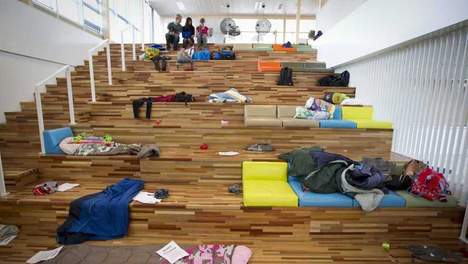Power to the people of of the International School Almere

The protests over the closure of Almere’s international school were a real lesson in people power for its pupils, writes Ellen Duckenfield.
On the last day before the summer holidays the students, parents and teachers of the International School Almere (ISA) were told out of the blue that their school will close. Effective immediately.
Shock and panic breaks out. Parents cancel their summer holiday plans and start a frantic search for alternative schooling. Some expats no doubt consider their options and think about leaving the Netherlands.
Pupils midway through their education feel their world under threat. Will they lose their friends? Be sent home or to a new country? Be forced to complete their education in a different language which for some may be their second or third?
Funding
ISA is a secondary school with around 150 students housed in a state of the art building on the outskirts of Almere Poort. It only opened it’s doors in April 2011. The design is undeniable. It is purpose built to be a school.
After such a big investment you have to question how the local government can consider closing it so abruptly, in particular given its importance to the region’s efforts to recruit international companies.
One main reason is that there have been deficiencies on the part of the school to recruit enough ‘international’ students. Because the school is partly publicly funded, they have an obligation to meet certain quotas.
The government is not prepared to subsidise Dutch children to attend an International School in their own country – and this has been the problem for ISA – the numbers of Dutch children are too high.
Along with a few other Dutch International Schools the aim is to provide affordable international education for the children of foreign nationals who work in the Netherlands. The Netherlands relies on foreign professionals, while their children need a consistency of language and instruction. Dutch children can also qualify if their parent’s jobs will require them to move overseas.
Definition
But how do you really define who is entitled to be ‘international’ and who is ‘Dutch’? The cut off point seems to be after three years, at which time you and your family are able to integrate into the Dutch system.
Looking back, I don’t think after three years in the Netherlands I would have stood a chance of passing any exams in a Dutch high school. More often than not we are also talking about second and third culture kids.
The Netherlands is fast becoming a world of multiple identities. A child with a Dutch mother and an Indian father who was born in Russia. This child may be Dutch on paper, but may identify more easily as part of the culture of the international community, where they are not the odd one out, but are together because they are all different.
Community
A school is a community. A community in itself but also in the wider context. There are knock-on effects for the town, for the workforce and for other educational institutions.
What would happen to the primary international school that feeds ISA? To the creches and preschool places that look after all the younger brothers and sisters? Decisions like this made by ministers who look at finance and quotas are often missing the human fallout.
So on Friday morning the shock of the news changed people. The gut reaction transformed into courage. They are galvanized and ready to fight for their cause. The children and their parents occupy the building. There are banners displaying the strength of feeling,
“We need a place too!”
The students are no longer lost or dispersed, they are united. They may have postponed their summer holiday, but they don’t let that dishearten them, the signs are hopeful, the atmosphere is exhilarant.
After a weekend spent sleeping in the school, on Tuesday night they finally hear that the public protest has been worth it. They have caught the attention of the newspapers. They have won. The school will stay open and the rent will be be paid for the next four years.
Family
I wonder how the students feel as they pack up their banners? To them it is not just a school, but an extended family. Out of school hours they have learnt an important lesson too. Not one that the teachers could ever have taught from the front of the class. A life lesson.
‘The whole experience has made us stronger and inseparable; it was a difficult, but amazing thing to be part of,’ said 14-year-old Maeve Verweij. Maeve is Dutch and Italian and has been at the school for three years.
When the summer holiday is over and they return to school they will feel an even greater sense of comradeship amongst their peers – this school is ours. And surely that is a life lesson worth learning.
Ellen Duckenfield writes the blog Run of the Windmill
Thank you for donating to DutchNews.nl.
We could not provide the Dutch News service, and keep it free of charge, without the generous support of our readers. Your donations allow us to report on issues you tell us matter, and provide you with a summary of the most important Dutch news each day.
Make a donation